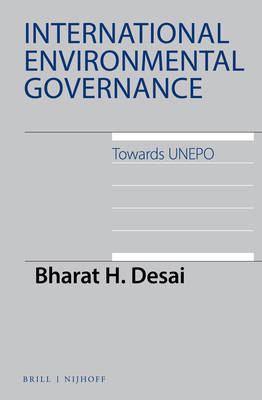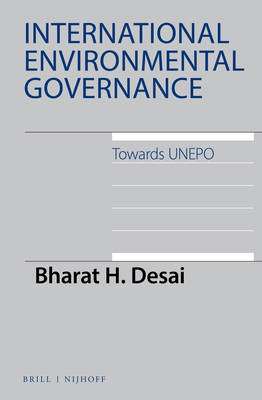
- Afhalen na 1 uur in een winkel met voorraad
- Gratis thuislevering in België vanaf € 30
- Ruim aanbod met 7 miljoen producten
- Afhalen na 1 uur in een winkel met voorraad
- Gratis thuislevering in België vanaf € 30
- Ruim aanbod met 7 miljoen producten
Zoeken
Omschrijving
International Environmental Governance: Towards UNEPO offers a significant contribution to practitioners and scholars involved in international debates regarding environmental governance. Clarifying the insufficiency of the 1972 UN General Assembly's model of a small UN Environment Programme in helping nations stem the accumulating degradation of the environment across the globe, the work poses the remaining question: how should international environmental governance be accomplished? The volume is timely in its examination of the post-Rio+20 period, and furthermore addresses the vital issue of the evolution of UNEP into a 'specialized agency' designated the UN Environment Protection Organization (UNEPO), a 'new mandate' to revive the UN Trusteeship Council to supervise environment and the commons, as well as law-making and institution-building processes as reflected in multilateral environmental agreements (MEAs) and other multilateral forms.
International Environmental Governance: Towards UNEPO addresses the law-making challenge presented by growth in MEAs and proliferation of international environmental institutions, with a thorough consideration of the debate regarding the need for and efficacy of global governance in the field of environment. Dr. Desai's timely analysis will assist diplomats, lawyers and scholars, citizens and civil servants alike in finding the new roads forward.
International Environmental Governance: Towards UNEPO addresses the law-making challenge presented by growth in MEAs and proliferation of international environmental institutions, with a thorough consideration of the debate regarding the need for and efficacy of global governance in the field of environment. Dr. Desai's timely analysis will assist diplomats, lawyers and scholars, citizens and civil servants alike in finding the new roads forward.
Specificaties
Betrokkenen
- Auteur(s):
- Uitgeverij:
Inhoud
- Aantal bladzijden:
- 424
- Taal:
- Engels
- Reeks:
- Reeksnummer:
- nr. 10
Eigenschappen
- Productcode (EAN):
- 9789004214545
- Verschijningsdatum:
- 15/05/2014
- Uitvoering:
- Hardcover
- Formaat:
- Genaaid
- Afmetingen:
- 163 mm x 241 mm
- Gewicht:
- 757 g

Alleen bij Standaard Boekhandel
+ 650 punten op je klantenkaart van Standaard Boekhandel
Beoordelingen
We publiceren alleen reviews die voldoen aan de voorwaarden voor reviews. Bekijk onze voorwaarden voor reviews.








